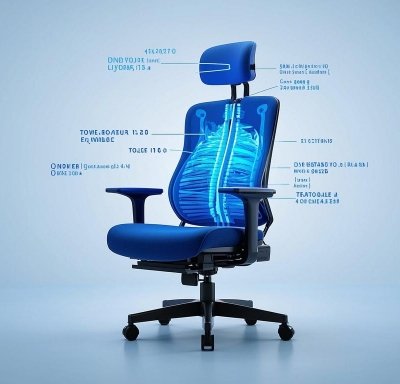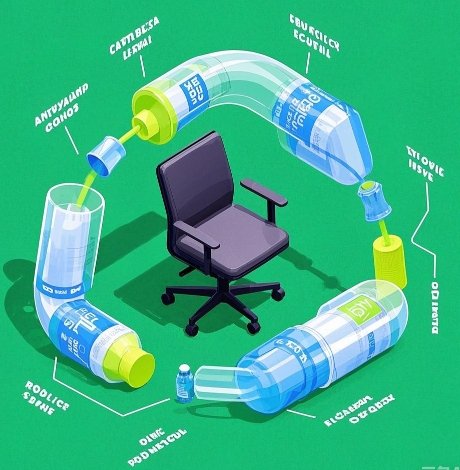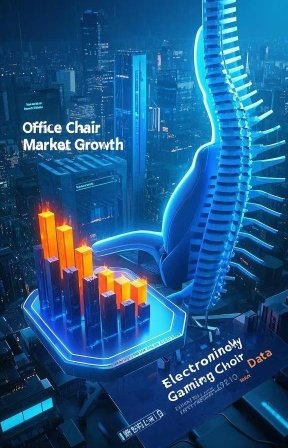Introduction: The Health Crisis of the Sedentary Era and Industry Transformation
As 42% of urban office workers worldwide sit for over 9 hours daily (WHO data), a poorly designed office chair is no longer just a comfort issue—it’s a silent “productivity killer” costing $26 billion annually (Bloomberg research). In the post-pandemic era, hybrid work models have accelerated the evolution of office chairs from basic seating to health management tools, driving industry-wide innovation in materials and smart technology. This article explores 2024’s key trends, backed by cutting-edge data and consumer insights.

I. Market Dynamics: Growth Drivers and Challenges
1. Market Size and Competition
- Growth: China’s office chair market exceeds ¥30 billion CNY ($4.5 billion USD), growing at 15% annually, with gaming chairs surging 37% (Statista 2023).
- Competition: Fragmented market—top brands like Herman Miller and Xihao hold just 20% share, while smaller players compete via affordability and customization.
2. Key Challenges
- Cost Pressures: Steel and plastic prices rose 45% in two years, squeezing profit margins.
- Homogenization: 80% of mid-to-low-tier products lack differentiation, triggering price wars.
II. Consumer Demand: From Functionality to Emotional Value
1. Demand Hierarchy Pyramid
| Tier | Characteristics | Case Studies |
|---|---|---|
| L1 | Basics (price/durability) | SMEs buying ¥1,000 bestsellers |
| L2 | Functionality (adjustable arms) | Xihao M57 series sells 1M+ units |
| L3 | Emotional appeal (IP collabs) | SecretLab x League of Legends edition |
| L4 | Multi-scenario use | Meditation-to-work convertible chairs |
Source: Reddit’s WFH Gear community survey
2. Gen Z-Driven Trends
- Aesthetic Premium: 63% of young buyers pay 30% extra for design (Tmall Home Furnishing 2023).
- Health Tech: Smart cushions with posture sensors are now essential for new hires.

III. Innovation Breakthroughs: Materials, Tech, and Sustainability
1. Material Revolution
- Lightweighting: Carbon fiber frames reduce chair weight by 40%, cutting logistics costs 20%.
- Thermal Control: MIT’s phase-change gel layers auto-regulate seat temperature.
2. Smart Integration
- HarmonyOS Ecosystem: Chairs sync with Huawei devices to adjust desk height and seating angles.
- Biosensing: Knoll’s 2023 concept chair uses EEG to recommend break times.
3. Green Transformation
- Circular Economy: Steelcase’s 100% recyclable nylon mesh cuts carbon footprint by 50%.
- Certifications: EU Ergonomics+ label becomes mandatory for corporate procurement.

IV. Brand Strategies: Differentiation and Marketing Innovation
1. Brand Positioning Matrix
| Brand | Tech Edge | Target Audience | Premium Strategy |
|---|---|---|---|
| Herman Miller | Aeron eco-fabric | Fortune 500 companies | 20-year warranty |
| Xihao | Douyin live-stream hits | SME entrepreneurs | Community-driven sales |
| SecretLab | Gaming IP collaborations | Gen Z freelancers | Limited editions + fandom economy |
Source: Financial reports and social media analytics
2. Marketing Innovations
- Content Influence: Bilibili’s “Ergonomic Chair Teardown Lab” videos hit 100M+ views, boosting Xihao V1 sales by 300%.
- Private Communities: Free posture assessments via WeChat groups increased conversions by 25%.
V. Future Outlook: The Next Frontier of Workspaces
1. Convergence Trends
- Human-Machine Integration: Brain-computer interfaces for “mind-controlled” lumbar support.
- Ecosystem Integration: Chairs syncing with standing desks and smart lighting systems.
- Cross-Industry Collaboration: Furniture and healthcare firms co-developing spinal health solutions.
2. Investment Insights
- High-Growth Sectors: Smart office chairs (29% CAGR), sustainable material suppliers.
- Risks: Patent wars (e.g., pneumatic adjustment systems), cross-border e-commerce policy shifts.
FAQ: Top Reader Questions
Q: What differentiates a 70vs.70vs.420 office chair?
A: Three factors: ① Gas spring safety (BIFMA certified); ② Lumbar support precision (±2mm); ③ Adjustability points (premium: 12+).
Q: How to verify ergonomic design?
A: Check: ① Adjustable seat depth; ② Independent lumbar support; ③ Armrests level with desk height.
Conclusion: Redefining the Value of “Sitting”
When a chair monitors heart rate, adjusts lighting, and optimizes team productivity through data analytics, it’s no longer furniture—it’s a manifesto for humanity’s pursuit of health and efficiency. In this era where “posture equals productivity,” every innovation in office chairs reshapes modern lifestyles.


